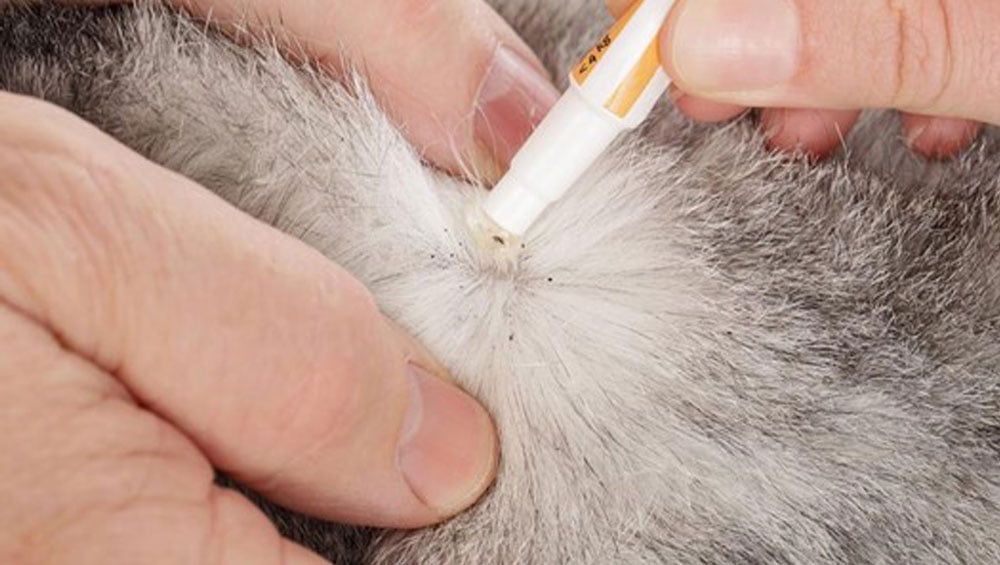
Cat fleas and your pet
Learn all about cat fleas, what symptoms to look out for and what risks these parasites pose for your pet.
What are fleas?
Fleas are wingless, blood-sucking insects with flat bodies that are found on mammals and birds. Only the adult stage lives on the animal with eggs and immature stages being found in the environment. Fleas can carry a number of diseases.
What do fleas look like?
Fleas are reddish/ dark brown in colour and notoriously difficult to spot as they are only around 1.5 – 3mm long. They are tricky to notice individually. Look for areas of small dark specks on your pets fur.
It is easier to see fleas within lighter coloured fur. Female fleas are slightly larger than males.

Are all fleas the same?
There are several species of fleas, however, it is the cat flea (Ctenocephalides felis felis) that causes the majority of clinical disease to cats and dogs around the world. Other species of fleas may cause problems in particular regions. The cat flea is remarkably non-specific about its host, which means it will infest your cats, dogs, rabbits or ferrets. Once these fleas enter your home, they will infect whichever animal the adult flea first comes into contact.
How do I know if my cat has fleas?
Owners often fail to spot an itchy cat as their clinical signs are often much more subtle than dogs. There is also a great variation in signs of flea allergy dermatitis for cats, they can be localised or general distributed over the body and they may or may not be symmetrical. Cats can develop eosinophilic plaques, itchy swellings that can occur on the body or lips. Miliary dermatitis is another common reaction for cats to get in response to a flea allergy. Miliary dermatitis is characterised by numerous small papules under the skin that can be appreciated better through touch than visual examination.
When itchy cats are more likely to overgroom or rub themselves on objects rather than scratch at themselves, these behaviours are more difficult for owners to interpret as itchiness.
Are fleas dangerous for my cat?
The presence of cat fleas can severely affect your pet’s quality of life, particularly if they have a severe flea allergy. There are however other clinical affects beyond skin irritation. In young, old or debilitated cats a heavy infestation of fleas can cause anaemia.
Fleas also carry the larvae of tapeworm D. caninum which is ingested during grooming, presence of this tapeworm is a strong indicator or a current or recent flea infestation.
Fleas spread bacteria Bartonella henselae, the bacteria that causes cat scratch fever, between cats. This bacterium can cause disease to humans, particularly children and those with a weak immune system. Consistent flea treatment is the best way to avoid cat-scratch fever.
Can I catch fleas from my cat?
Fleas found on cats and dogs cannot live on humans, however, that does not mean they won’t try to sample your blood. Flea bites often occur in groups of two or three, they may be itchy but these hitchhikers will not hang around for long. If your home is infested with fleas from your pet, you may find bites around your ankles.
What to do about a flea infestation
Only a quarter of a flea’s life will be spent on your cat. The rest of the lifecycle of a flea will be spent as eggs, larvae and pupa. A newly emerged flea will quickly look to find an animal to feed off then beginning laying eggs – as many as 20 – 30 eggs a day. If you find that fleas are reappearing in your home then a series of measures need to be taken to stop the flea lifecycle. Treat your home with a flea spray for carpets and ensure all bedding and soft furnishings are laundered on a hot wash.
Continue to use a monthly flea treatment such as Advantage Spot-on for cats or Frontline Plus for cats to kill fleas and prevent them from surviving on your cat. It may take several months to bring a flea infestation under control.
The best way to prevent cat fleas
Regular treatment for cat fleas is the best way to prevent cat fleas from developing. You can protect your cat from the hidden dangers of fleas, ticks and worms with our hassle-free regular subscription box. We only use market-leading products such as Advantage Spot-on and Frontline Plus for Cats. Find out more about the products we use to keep your cat healthy, happy and parasite-free.
Written by Lindsay Rose MA VetMB CertAVP CertVBM MRCVS.